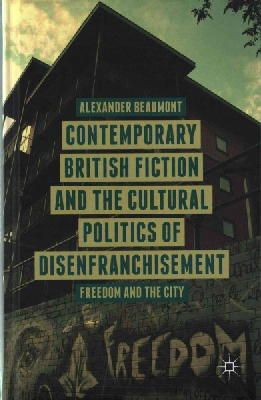
Stock image for illustration purposes only - book cover, edition or condition may vary.
Contemporary British Fiction and the Cultural Politics of Disenfranchisement: Freedom and the City
A. Beaumont
€ 66.82
FREE Delivery in Ireland
Description for Contemporary British Fiction and the Cultural Politics of Disenfranchisement: Freedom and the City
Hardback. By examining the representation of urban space in contemporary British fiction, this book argues that key to the political left's strategy was a model of action which folded politics into culture and elevated disenfranchisement to the status of a political principle. Num Pages: 248 pages, black & white illustrations. BIC Classification: 2AB; DSBH; DSK; JP. Category: (P) Professional & Vocational. Dimension: 147 x 224 x 19. Weight in Grams: 422.
By examining the representation of urban space in contemporary British fiction, this book argues that key to the political left's strategy was a model of action which folded politics into culture and elevated disenfranchisement to the status of a political principle.
By examining the representation of urban space in contemporary British fiction, this book argues that key to the political left's strategy was a model of action which folded politics into culture and elevated disenfranchisement to the status of a political principle.
Product Details
Publisher
Palgrave Macmillan
Format
Hardback
Publication date
2015
Condition
New
Weight
422 g
Number of Pages
239
Place of Publication
Basingstoke, United Kingdom
ISBN
9781137393715
SKU
V9781137393715
Shipping Time
Usually ships in 15 to 20 working days
Ref
99-15
About A. Beaumont
Alexander Beaumont is Lecturer in English Literature at York St John University, UK.
Reviews for Contemporary British Fiction and the Cultural Politics of Disenfranchisement: Freedom and the City
“Beaumont ultimately provides a timely, accessible and highly engaging analysis of the battle between left culturalism and Thatcherism, and its subsequent influence on contemporary British literature. … The wide-ranging and interdisciplinary nature of the study ensures the work will be essential reading to cultural theorists and literary researchers alike.” (Kristian Shaw, English Studies, Vol. 97 (7), 2016)
